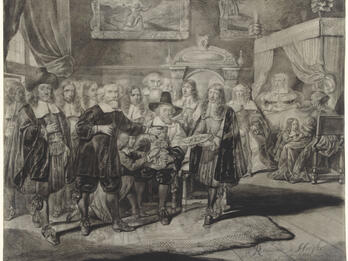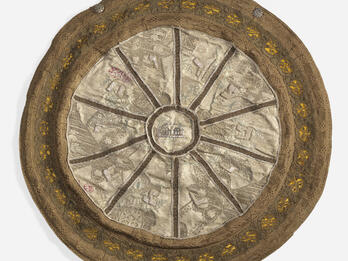Shene luḥot ha-berit (Two Tablets of the Covenant): On Rearing Children
A crucial and fundamental principle is the proper rearing of children. The Torah has stated: And you shall teach them [the words of Torah] to your children (Deuteronomy 11:19), for that is the underlying purpose of the commandment to be fruitful and multiply—it is in order that one should have children and grandchildren perpetually engaged in Torah and commandments. Now it is well known that man is born like a wild ass (Job 11:12) and that the inclination of man’s heart is evil from his youth (Genesis 8:21). Accordingly, it is necessary to accustom him to and train him in worthy and upright character traits from the time that he begins to talk. [ . . . ]
And the father should start guiding his son in all matters from the age of two or three. There are two reasons why he should begin guiding him from his early youth: the first is that our rabbis of blessed memory have declared: “Youth is a wreath of roses” [b. Shabbat 152a]—everything an individual acquires in his childhood remains with him throughout his life. And that is the meaning of what is stated: Educate each child according to his way [and even when he is old, he will not depart from it] (Proverbs 22:6)—while still a small lad, he should conduct himself with worthy character traits, and then, as he grows older, he will not change course. The second reason is that when the father begins to admonish his son with the rod of chastisement and by instilling great fear into him while the child is still young—that is to say, he ought to be firm on the surface with abundant love for the child beneath—the child will develop the regular habit of respecting his father, being in awe and piety, so that he will pay heed to his father’s reproof even in old age. However, if his father were to have displayed excessive affection toward him in his youth, and never to have caused him displeasure [see 1 Kings 1:6]—heaven forbid!—then, later, when he grows to maturity, he will divert his ears from listening to the voices of his father and mother. The rabbis compared this matter to a newly planted sapling. While it is very young, a person can move it around and straighten it at will, but once the tree has begun to grow crooked, it is impossible to straighten it afterwards. So is the case in regard to a young lad; and concerning this, King David, peace be upon him, declared: That our sons shall be like plants grown tall in their youth, etc. (Psalms 144:12), which alludes to the comparison with the planted tree referred to above. Therefore he who loves him administers reproof to him at an early stage (Proverbs 13:24); that is to say, he should arise early in the morning, meaning, while he is still young, as the word shiḥaro is derived from childhood and youth [shaḥarut] (Ecclesiastes 11:10).
Now in regard to this notion of “early youth,” the sages of the Mishnah have warned that “morning sleep [takes a man out of the world]” [m. Avot 3:14]. While the plain meaning is true, it is also equally true that the father should be careful not to allow his son to sleep in in the morning—that is, the sleep of early youth. And likewise, each and every individual ought to accustom himself in his early youth, and one should bestir oneself intensely over this; and if—heaven forbid!—he whiles his youth away in sleep, “Woe to that wreath (of roses) that goes forth but does not return” [b. Shabbat 152a]. [ . . . ]
And women are commanded to rebuke their children, like the father, and even more so, for the reason that they are available and at home to a greater degree. Whichever way one chooses to view the situation [the mother is more often with the child]—if the father is a Talmud scholar, he will be preoccupied with his learning and will be unable to constantly monitor the child’s actions; whereas if he is engaged with business affairs and traveling [from place to place], then, for the most part, the man will be absent from home. In Tractate Berakhot, chapter two (17a) [it is stated]: “Greater is the promise that the Holy One gave to women than that [which He gave] to men, as it is says Arise, O women who are at ease [with themselves], listen to My voice; O daughters [filled with] confidence, give ear to My words (Isaiah 32:9). Said Rav to R. Hiyya: ‘In what ways do women acquire merit? By getting their sons to attend synagogue, to study scripture; by getting their husbands to study in the Talmud academies; and by waiting for their husbands to come home from the academies.’” Now since women have tender natures, the obligation rests upon the woman to “wear men’s clothes”; by which I mean that she should develop a heart of steel, to reprove [her child] with a chastising rod and to administer a sound beating. Even though he may shout and cry out, she should pay no heed to him, until he abandons the path of evil and walks in the path of virtue and uprightness. And, by way of allusion, I cite: The hands of merciful women boiled their own children (Lamentations 4:10)—by which I mean that those very women who take pity on their children, by refraining from hitting them, are the ones responsible for boiling them, namely, for killing them—it is as though they had slaughtered them and cooked them like the flesh of an animal, beast, or bird.
And fathers and mothers should pray regularly for their offspring to become Torah scholars, and righteous people, of excellent character. And a person should have this ideal in mind when reciting the morning blessing on studying Torah: “And may we and our offspring,” etc., and likewise, when reciting the blessings before the Shema‘ “With great love” [Ahavah rabbah]: “Our Father, merciful Father, Who is merciful, have mercy upon us and place within our hearts.” The person praying should also have in mind his children and their descendants forever. And similarly, when he recites [in U-va le-tsion], “So that we do not toil in vain and produce children for futility.” In all instances such as these, he should regularly concentrate on his prayer with all his heart and all his soul. And likewise, we find in the collection [Tanna debe Eliyahu Rabbah (Teachings of the School of Elijah)] on the verse Trust in the Almighty (Psalms 37:3) as follows: “It was taught in the School of Elijah: ‘The story is told of a certain priest, who feared heaven in secret, and who had ten children from one wife, six males and four females. Each day he used to pray and prostrate himself and lick the dust with his tongue, beseeching God that none of them should fall prey to transgression, or to an unworthy thing. It was said that before a year had passed, Ezra arrived, and the Holy One brought Israel up from Babylonia [to the Holy Land], and He brought up that priest too; and that priest did not enter into his eternal rest before having seen High Priests and junior priests from among his sons and grandsons for a period of fifty years; and only after that that he passed on to his eternal rest. In reference to him it is written: Trust in the Almighty, and do good, etc. (Psalms 37:3)’” [ . . . ]
A fundamental rule to be maintained by the father who is rebuking his son, in order to make certain that he will follow the right path, even in private, not in the father’s presence: he should see to it—with all the force at his disposal—that he inculcates within him the trait of truthfulness, as it is written: Teach their tongue to speak truthfully (Jeremiah 9:4). And he should describe to him in great detail the punishment for speaking falsehood, even during idle conversation, and he glorify before him the great reward reserved for one who speaks the truth; and he should instill fear into him, that if he utters one word of falsehood, he will give him very severe warnings. The outcome will be that when this trait of truthfulness is permanently implanted within the heart of the son, then the son will fulfill all the commands of his father, fearing that his father will ask him, “Did you do such-and-such a thing?” or “What is this thing you have done?” Accordingly, he will reply truthfully to him out of fear—as he will be afraid that he will be caught out and found to be a liar, and given an exceedingly great punishment. As a result of his being compelled to tell the truth, he will perforce become one who shuns evil and does good (Psalms 34:15).
Credits
Isaiah Horowitz, “On Rearing Children,” in Sefer shene luḥot ha-berit ha-shalem (Two Tablets of the Covenant) (Jerusalem: Mekhon shaʻare ziv, 1993), pp. 285–287 (letter D, nos. 13–18).
Published in: The Posen Library of Jewish Culture and Civilization, vol. 5.




